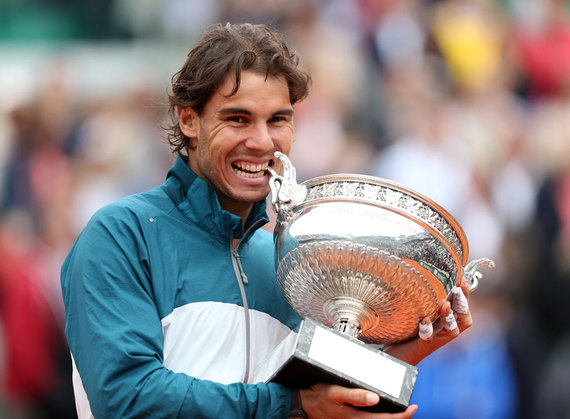In the early hours of Monday morning (from my position in the world), I watched as Rafael Nadal beat Novak Djokovic in four sets to claim his ninth French Open title. I realize that there will be lot of articles popping up around the planet over the next week or so, proclaiming how Nadal is closing further in on Roger Federer's position as the Greatest of All Time (GOAT). In this post, I will provide my personal opinion to the debate, and will set the record straight on why it is impossible to compare different eras.
The thing that we can definitively say from seeing Nadal claim his ninth Roland Garros crown is that Nadal at the French, is the most numerically successful player at any tournament throughout tennis history. But to say that Nadal is the greatest of all time on clay, because of this achievement, along with his multiple Masters titles, and other minor tournament victories on the surface; is wrong. How can we ever be sure that Nadal would have beaten Guillermo Vilas in 1977 (when he won 13 clay titles), or Thomas Muster in 1995 (if they had the same level of training and technical equipment as today)? The fact is that we can't. However, we can speculate on what the conclusion of these contests would be.
How the GOAT ranking is often made is by looking at the number of Slam titles that a player has won. What the 2014 French title means for Nadal in this respect, is that he moves alongside Pete Sampras with 14. What many will now say is that Nadal surely has the more rounded Slam record than Sampras, since he has won a Career Slam and Sampras couldn't even make the French Open final. So in a certain respect Nadal has now moved above Sampras in the GOAT ranks. But as with the Vilas example, this doesn't necessarily mean that Nadal is better than Sampras. We can never be sure that Nadal would have beaten Sampras on Grass during his peak years, or that Sampras would have beaten Nadal, which most would suspect that he would have. What we can definitively say though, is that Sampras is the more numerically successful player at Wimbledon, since he won seven titles, compared to Nadals (so far) two.
So if it is impossible to compare players of different eras, then is it possible to compare players from the same era with more accuracy? To some degree yes, but only to a certain degree. Thinking about the Nadal v. Djokovic rivalry, their record now stands with Nadal holding a 23-19 advantage. But this advantage is skewed in terms of surface types and towards different times in the course of their rivalry. Nadal holds a 14-4 record on clay courts, while on hard courts Djokovic holds a 14-7 advantage. In the period up to the end of 2010, Nadal won 16 of their 23 matches. Many of us know though, that during the course of the 2010 season Djokovic drastically altered his diet and training regime. And of course he had that glorious run right through 2011, winning three Slam titles and 5 Masters, along with besting Nadal in seven consecutive matches all up (running through to the 2012 Aussie Open final). Djokovic has won 12 of their 19 matches since the beginning of 2011.
We can say the same thing about Nadals rivalry with Federer, as although it stands at 23-10 in favour of Nadal, it again is skewed towards different surfaces and times. On clay courts, Nadal is 13-2, but on indoor hard courts Federer holds a 4-1 advantage. Against a lesser player of this era, like Andy Roddick, Nadal holds a 7-3 head-to-head advantage. Obviously Nadal is the more numerically successful player in terms of Slams won (14-1) and total titles (64-32). However on the Dubai hard courts in 2008 (when Roddick scored one of his three wins), Nadal was not the better player on the day.
This concept of on the day, is the critical ingredient of any discussion in Sport, and indeed with life in general. We often hear losing tennis players say after a match that their opponent was simply 'the better player on the day'. But why do they say this? The reason I believe is that that they recognize (either consciously or sub-consciously) that we only ever live in the moment, and in indeed in 'the day'.
Sometimes in life we can spend too much time looking in the rear-view mirror, and contemplating and debating the past. But often we can forget to look at what is happening in front of our eyes. And consequently we sometimes forget that we should be focusing on enjoying the moment. We should be putting the vast majority of our energy into doing whatever we are doing right now to the best of our ability. Whether that is enjoying watching sports, or developing ourselves for the future.
The tennis world at this time is certainly one to enjoy. The Djokovic-Nadal rivalry and the Federer-Nadal one (both of which are sadly on the back stretches) have just been magnificent to watch and admire. These players are brilliant examples of what the advantages are of living in the moment, and constantly striving to be the best you can be. The beauty of the game and the admirable qualities of the players are what we should be focusing on, rather than on whether or not this player or that is the GOAT.
